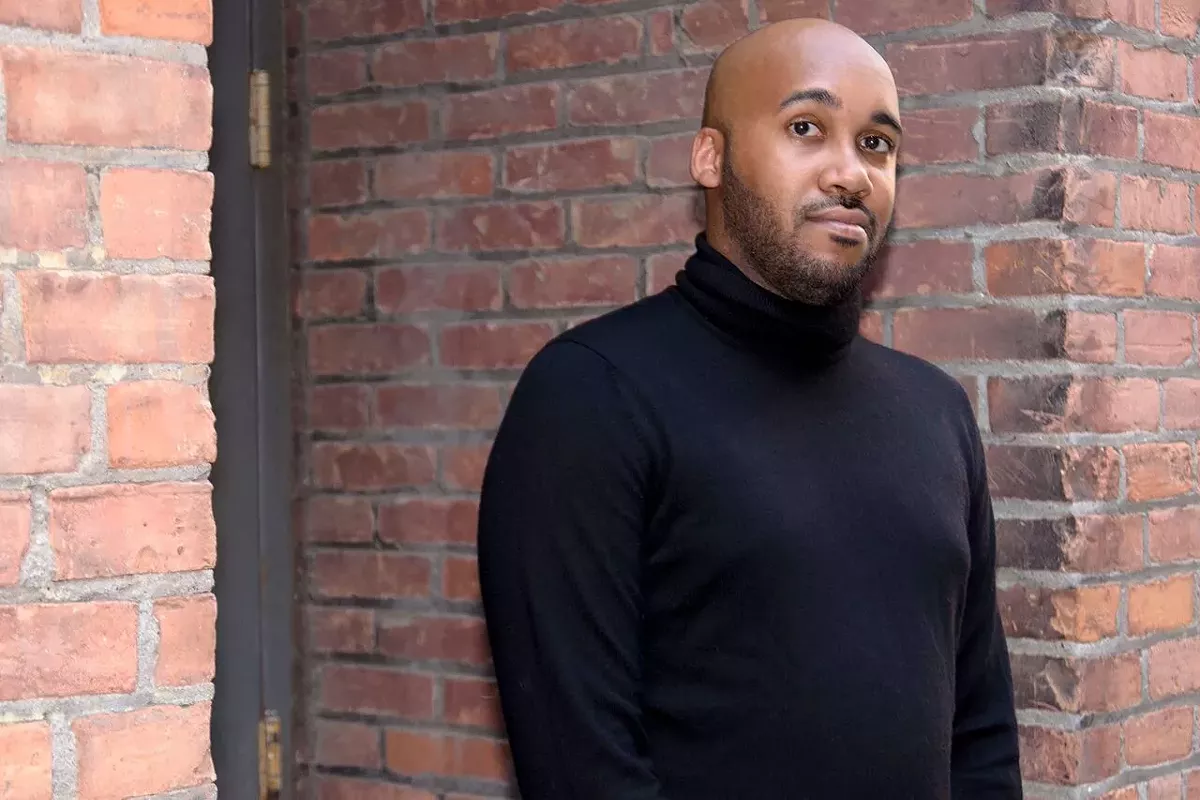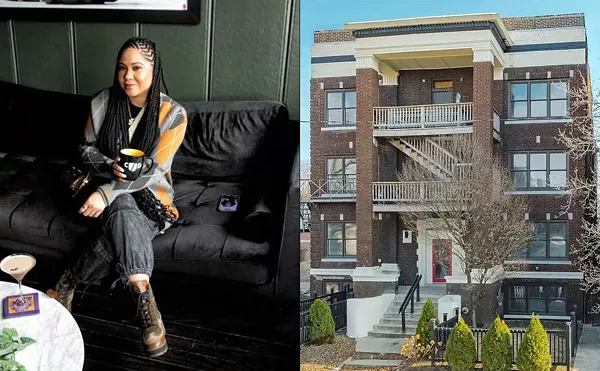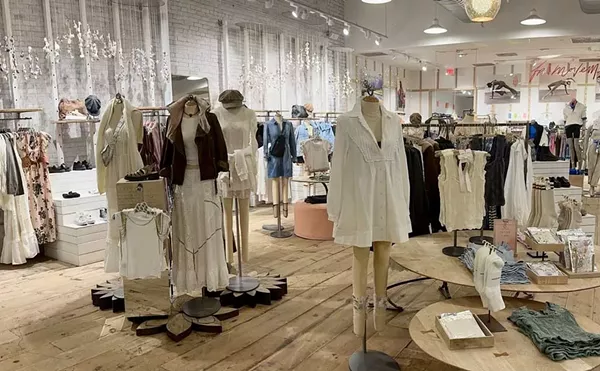

Audio By Carbonatix
[
{
"name": "GPT - Leaderboard - Inline - Content",
"component": "35519556",
"insertPoint": "5th",
"startingPoint": "3",
"requiredCountToDisplay": "3",
"maxInsertions": 100,
"adList": [
{
"adPreset": "LeaderboardInline"
}
]
}
]
Detroit native and BLAC magazine editor Aaron Foley has written a new book. It's called How to Live in Detroit Without Being a Jackass, and it's now available from Belt Publishing (240 pages, $19.99, beltmag.com). An excerpt is reprinted here with permission.
One of the first people you meet upon moving to Detroit will be an overenthusiastic native of Detroit's suburbs who can't wait to tell you how awful the suburbs are. We'll call them Madonnas.
You know, Madonna the pop star. She was born Madonna Lourdes Ciccone, and raised in Bay City, a city two hours north of Detroit, and Rochester Hills, an actual suburb of Detroit. She graduated from Adams High School, went to the University of Michigan for a time, dropped out, moved to New York, and never looked back.
It is written in the unofficial Detroit rulebook that anyone with even the most tenuous connection to the city must hold it up high at every opportunity. When pursuing solo stardom after leaving the Supremes, Diana Ross would ask her relatives at home in Detroit to watch over her children, believing that life in the inner city would keep her wealthy offspring guarded. At the height of her career, Anita Baker filmed a music video in Detroit, paying tribute to the many landmarks she frequented prior to becoming a force. She lives in the Detroit suburbs today, as do Aretha Franklin, Bob Seger, and Eminem.
In her 30-year career, Madonna has toured many times, but has not stopped in Detroit on a few of her outings. She has negative things to say of her upbringing in Rochester Hills, calling it boring and uncultured. But, unlike Madonna, most of those who find the suburbs beige don't make it to New York City and superstardom. They just come right down I-96 or I-75 and plop themselves in the mix in Detroit. And they won't shut the fuck up for two seconds about how uneventful their lives were in the 'burbs. They are Madonnas.
One of my mother's best friends used to have a condo in Southfield in a high-rise tower. I watched Little Man Tate on a big TV there, in a living room with tall windows from which you could barely see the Detroit skyline miles away.
This condo was the piece of the pie the Jeffersons were taking about. Southfield was for years an inner-ring suburb to which well-to-do African-Americans moved on up. There was a time, for a lot of us, when it signaled that you made it.
In the 1980s and '90s a lot of Detroit blacks started to head north. Crack was spreading through the city like kudzu, Devil's Night fires were at an all-time high. Not every neighborhood plunged into the abyss; the neighborhood I grew up in still stands today, even though we had a local crackhead who stole our snowblower in the summer and our lawnmower in the winter. But for those who could afford to move up, leaving Detroit when things were getting bad — but not nearly as bad as the economic collapse of the late 2000s — was simply a pre-emptive strike.
In Detroit, blacks tend to follow Jews to the city limits. Southfield, as well as a few Oakland County suburbs, had seen meteoric rises in Jewish populations in the years since the 1967 riots In the 1980s, Southfield's black population began to swell as well. Hope United Methodist Church was one of the epicenters of the new Southfield, as well as a general galvanizer of suburban black Detroit.
Hope was a struggling Methodist church with a declining white congregation. A new pastor was installed, but congregants were shocked to discover that the governing body had chosen a black minister. Some of the congregation did not take it well. Despite his credentials — the new pastor was the fourth in a line of Methodist preachers — he was often served coffee with coagulated saliva frothing atop the cup. But if you've read the Bible, it's full of stories about testing the worthy and the chosen.
White congregants began leaving the church in droves, but as word of a new, fiery preacher began spreading, new black families poured in, including mine. When we formally became members of Hope, only one white family remained. They always looked so out of place. It was a married couple with four or five children, dressed so dowdy and dull. Us blacks show up! and show out! for the Lord: big church hats, sequins, glitter, furs, gator shoes, gold bracelets. Still, whenever the congregation rose for a hymn, the white family rose as well. They sang along to the black hymns, and always stood in line to thank the pastor after service.
How strange was it that the only white family in the church seemed to be the least prejudiced? The thing about black families in the suburbs was they bred a whole generation of snobby-ass kids. Not bourgeois. Beyond bourgeois. Just straight-up noveau riche wannabes with little connection to their parents' home cities and a warped sense of reality.
Hope had a youth church that my mom made me go to, and in that youth church were two black girls who went to West Bloomfield High School. Despite being black in the Midwest, they both had Valley Girl accents, using our down times during service to talk about their mall escapades, their all-night parties, and who's-dating-who in what-clique. Picture Dionne in Clueless, only twice as haughty, and not nearly as in touch with their own culture as they should have. Dionne at least knew the importance of black hair maintenance. Based on how dry these girls' hair was, they were obviously taking tips from their white classmates.
One day the youth pastor asked about Jubilee, a novel about slavery, and whether any of us were familiar with it. "Oh, no," one of the West Bloomfield girls replied. "That's Detroit Public Schools."
Public. I can never forget the icy chill in her voice when she said that word. It's like, you go to a public school too! But a public school in the suburbs is just so much better than a Detroit one, right?
I didn't say anything then, but I should have. Maybe God took care of her for me.
Ask any suburban Detroit resident what they associate with their hometown and you'll likely get a variety of answers, most of them negative.
Small-minded. Racist. Subdivisions. Meth addicts. Heroin addicts. Hicks. "Everyone from my high school still lives there." Backward. Conservative. They are ashamed of where they are from.
Around the holidays, your suburban-born friends who now live in the city lament having to drive all the way up (insert freeway here) for the holidays, because suburbia is so lame. Never mind that their car insurance may be registered there. But it's just such an inconvenience to drive a few miles away from Detroit.
Something to keep in mind when living in Detroit is to stop fucking complaining about the suburbs after you move here. I get it, some of you might have had parents and grandparents who were part of the resistance to anything having to do with Detroit. But some of you still had comfortable upbringings not always seen here in the city.
I grew up in a fairly safe middle-class enclave of the city. Not all Detroiters did. I remember a girl in my high school talking about the street she lived on: "Abandoned house, abandoned house, regular house, abandoned house..." Why can't she just move? I used to think. But even before the economic crash, people couldn't. Be grateful that your parents' cookie-cutter colonial isn't surrounded by blight.
Regardless of what suburb you grew up in or what suburb you may choose to live in now, you must identify yourself as being from that suburb when you go out of town. That's the rule, sorry. You are not from Detroit if you grew up in Shelby Township.
Detroiters are territorial. We are territorial because we have our own culture here that is not duplicated elsewhere — and I'm not talking about coney dogs. I'm talking about dancing, music, architecture, fashion, slang, attitudes. There may not be much difference between someone who grew up in, say, Sylvania Township and someone who grew up in Toledo. But there are huge differences between people who grew up in the city limits of Detroit versus the suburbs.
Now for the record, we're all from metro Detroit. But there's still a difference between "Detroit" and "metro Detroit." Generally speaking, metro Detroit is the tri-county area that includes Wayne County, Oakland County, and Macomb County. Detroit is obviously the anchor. It's in Wayne County.
The Wikipedia mafia will be quick to point out that certain census designations include other counties like Washtenaw, Lapeer, St. Clair, Livingston, and Monroe. But if we're talking cultural similarities, driving distances, and the evolution of the city and its suburbs, the tri-county definition is the way to go.
Like a lot of things around here, these divisions are tied to the race and class divisions that were established decades ago. If someone's from Highland Park, Texas, they're going to say they're from Dallas. If someone's from Highland Park, Michigan, they're going to say they're from Highland Park.





